Is Africa the next frontier for esports and pro gaming?
Esports could provide a viable career option for young gamers across Africa
- Published
"This move is so annoying!" 26-year-old Sylvia Gathoni groans at her TV, watching in frustration as her opponent hits her player multiple times in a vicious combo of punches.
She is sitting in her living room in Kenya's capital Nairobi, controller in hand, eyes laser-focused on the screen.
For anyone else, this would be a casual gaming session.
For Gathoni, it's training.
"My favourite game is Tekken," she says.
"I play Tekken 8 competitively, but I'm also a huge fan of RPGs (role-playing games) and adventure games."
IOC in 'advanced' talks for Olympic Esports Games
- Published14 June 2024
Olympic esports will level the playing field, says boss
- Attribution
- Published16 July 2024
More popularly known by her gaming moniker 'QueenArrow', Gathoni is one of the few full-time professional esports athletes in Africa.
And Gathoni's journey reflects the continent's fast-growing esports industry.
"When I first got into gaming, I didn't have the intention of going pro," she explains.
"But when I realised people made a living and went to tournaments overseas, I figured this was a good path to go."
Africa gets in the game
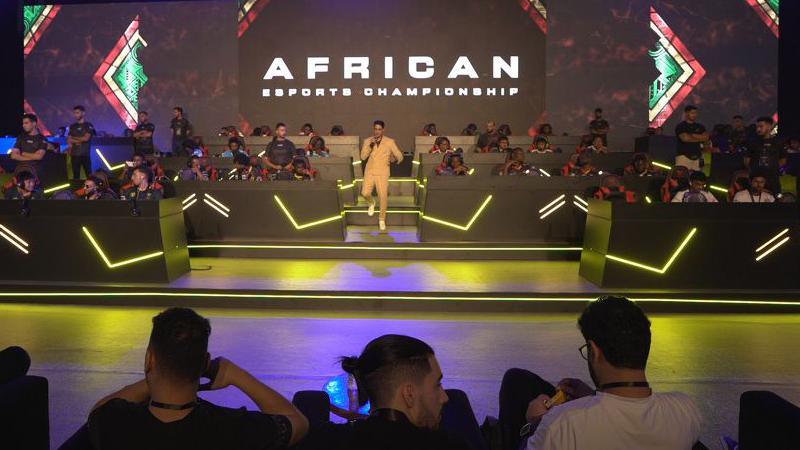
Morocco hosted a regional qualifier for the African Esports Championship in August
This year's Africa Games Industry Report reveals a rapidly growing gaming scene, particularly in Nigeria, South Africa, Kenya, Ethiopia and Ghana.
It found that for Africa's 200 million gamers, online mobile gaming is most popular, representing 95% of the player population.
Consumer spending has surged, with sub-Saharan Africa's in-app purchases totalling $778.6m (£597.2m) in 2022.
In the same year, South Africa led the way with an average revenue per user of $12 (£9.20).
In 2024, gaming in Africa is projected to generate over $1bn (£0.77bn) in consumer revenue, according to Netherlands-based gaming analytics company Newzoo.
In addition to increased consumer spending, esports tournaments have also been gaining traction, with both grassroots and championship-level events.
South Africa, Kenya, Morocco and Nigeria have all hosted large tournaments featuring Africa's best talent.
But as some of the world's biggest events offer prize pots totalling more than $30m (£23m), African prize money largely ranges from $10,000 (£7,600) to $100,000 (£76,600).
While Gathoni has gained recognition on the more lucrative international stage, she believes local competitions remain crucial for nurturing emerging talent.
Youth market
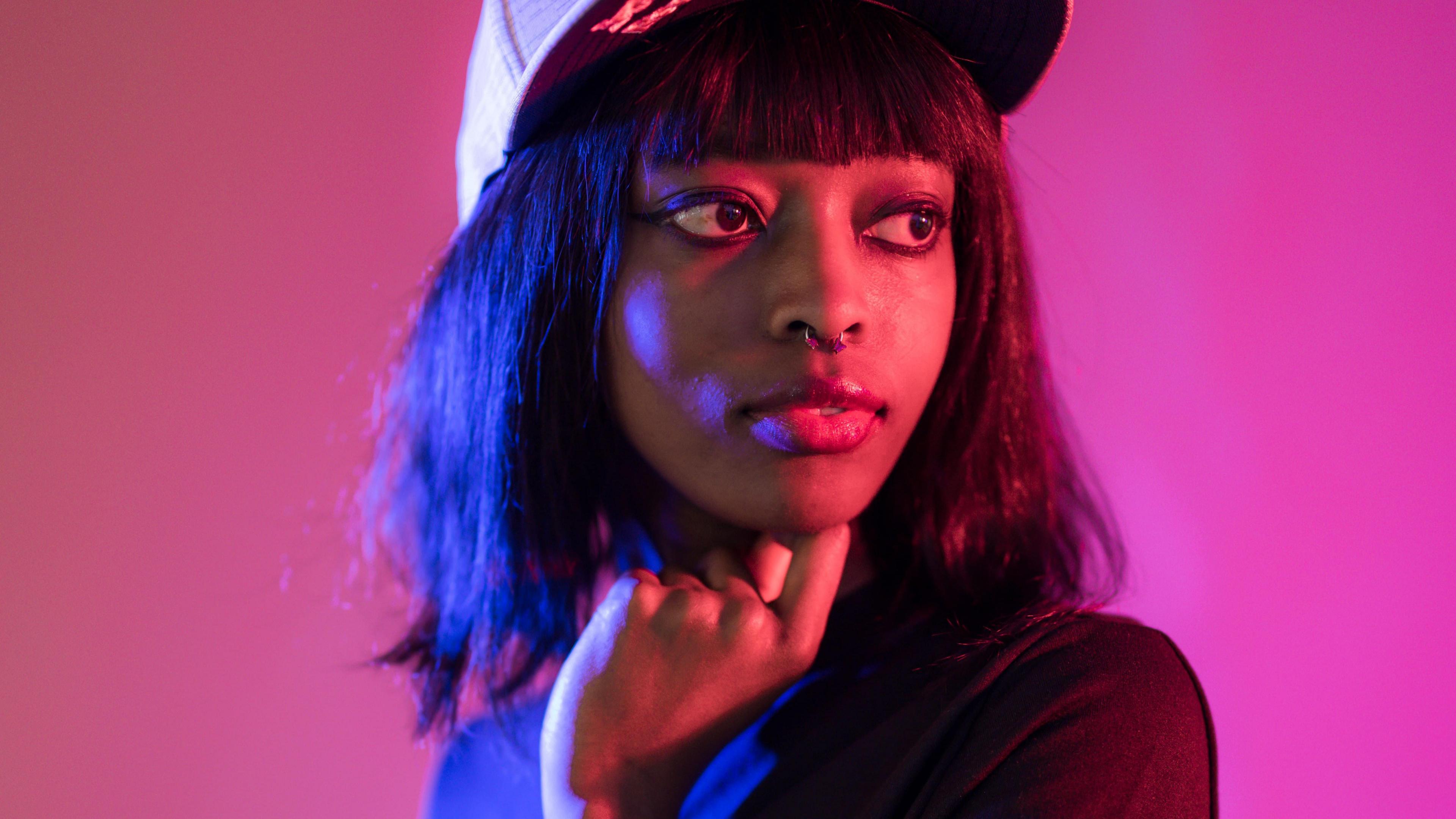
Sylvia Gathoni, aka QueenArrow, is one of few full-time professional esports athletes in Kenya
Given Africa's youthful population - with a median age of 19.7 years - it is perhaps no surprise that gaming's appeal continues to grow.
The boom is also being driven by increased smartphone access and improved connectivity.
But there is a disparity when it comes to gender.
Globally, women represent nearly half of the gamer population, but in Africa female representation in esports remains relatively small.
Initiatives like the GIRLGAMER Esports Festival and Women in Games Africa are trying to change that, and leading figures like Gathoni are inspiring more women to go pro despite gender bias and harassment.
Efforts are being made to create more inclusive spaces for female gamers to thrive by featuring more women-only elements.
For instance, August's African Esports Championship regional qualifier in Morocco featured two women's leagues, bringing together teams from Egypt, Madagascar, Morocco, South Africa and Tunisia.
Gaming’s star talent
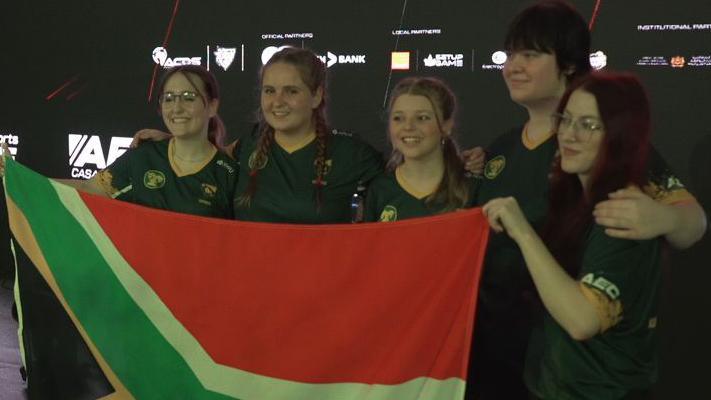
South Africa's women won the Counter Strike 2 competition at the regional qualifier in Morocco
As well as the introduction of women's leagues, the African Esports Championship regional qualifier was significant for another reason.
For the first time, the event in Casablanca brought together 180 players from 17 countries as part of the championship's first-ever in-person event.
"We have a very active gaming community here in Morocco," said Emmanuel Oyelakin, secretary general of the African Confederation of Digital Sports (ACDS), one of two organisations in charge of the event alongside the International Esports Federation (IESF).
Held at the King Mohammed V sports complex, Oyelakin said support from the Moroccan government made the country the best choice to host.
"To come here and know that we are part of Africa and that we can experience it with others is just amazing," said Jessica Greef, captain of South Africa's Women's Counter Strike 2 national team.
According to Oyelakin, the championship was crucial for showcasing Africa's esports potential on a global stage, levelling the playing field for gamers who often face greater challenges linked to infrastructure and finance compared to their international counterparts.
Long road ahead
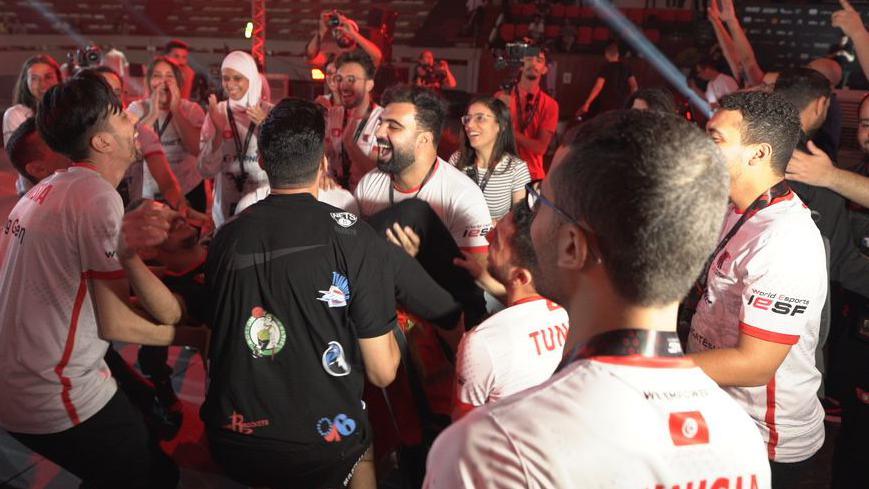
Tunisia was among the 17 countries represented at the African Esports Championship regional qualifier
One of those challenges is an underdeveloped internet infrastructure, something that makes it difficult for players to stream their games and connect with global audiences.
For Gathoni, competition also remains an issue.
"We need a structure to facilitate the growth of tournaments and the skill gap. In regions like Europe and North America, there's a tournament culture that keeps players' skills sharp," she explains.
Despite these challenges, Gathoni and many esports athletes like her are optimistic about Africa's future.
"The time has come for us to stop seeking validation from the outside world," she says.
"We need to create structures for ourselves and grow our industry on our terms."
Oyelakin also predicts that African esports could become one of the world's biggest markets within the next five to ten years.
"Before now, people believed that Africa wasn't a force to be reckoned with when it came to esports activities. [The African Esports Championship] has given Africa the opportunity to make its mark."
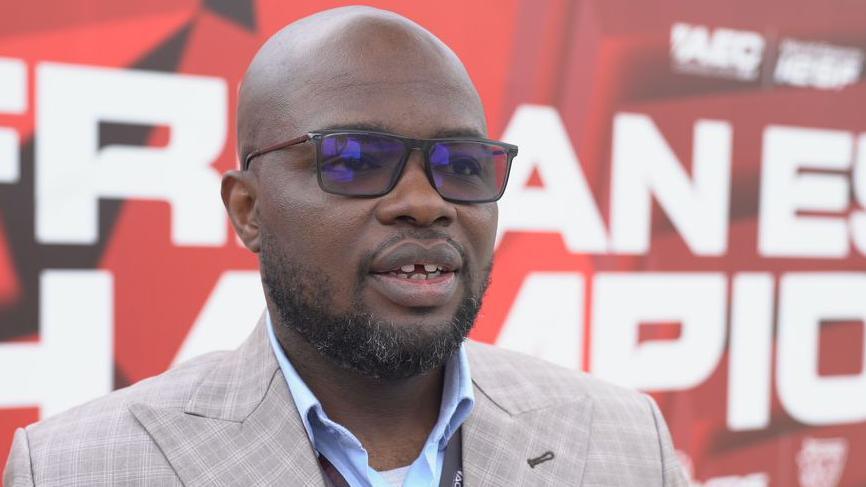
Emmanuel Oyelakin of the African Confederation of Digital Sports predicts a bright future for esports on the continent